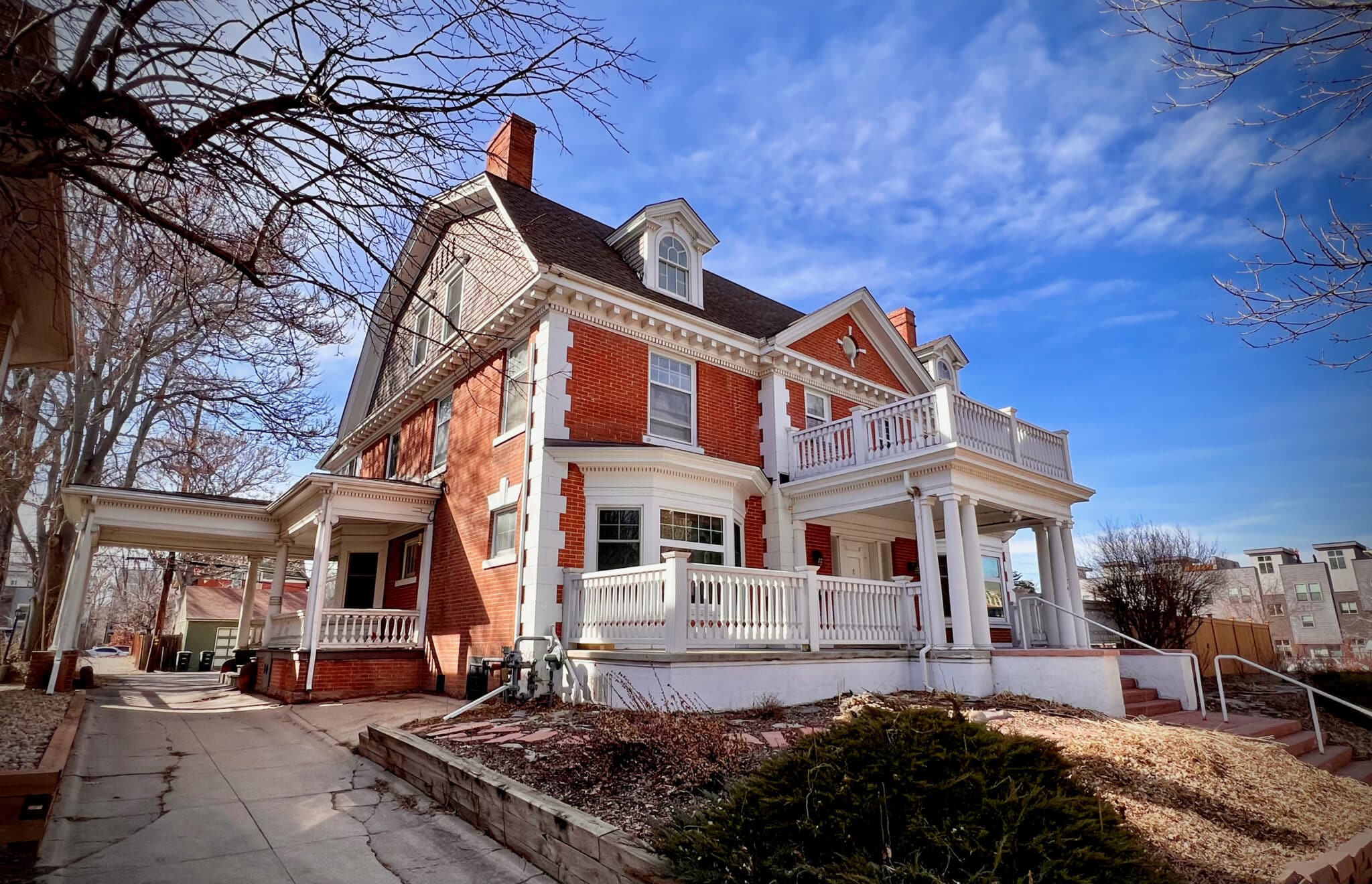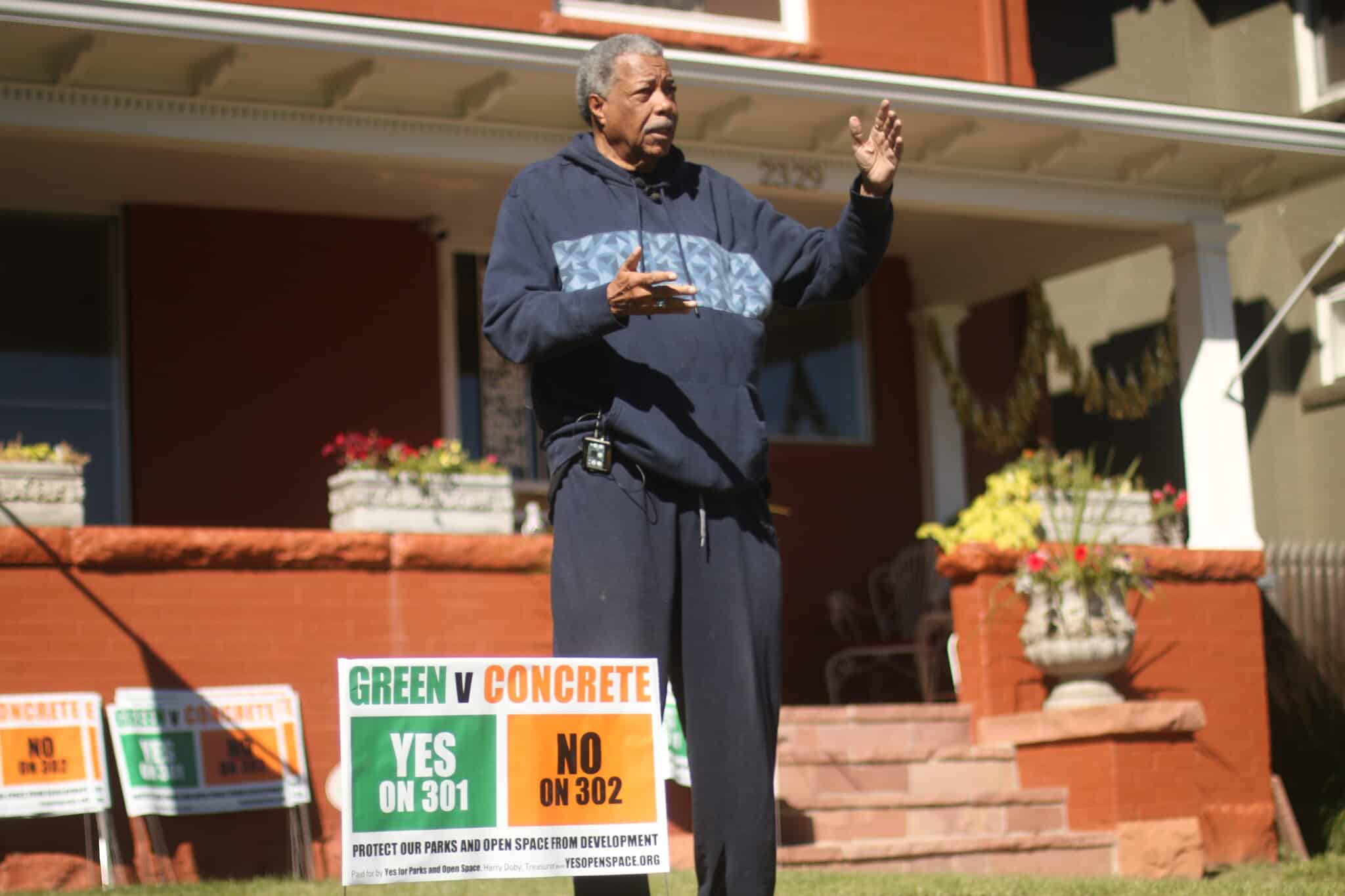
Mike Mathieson at a property he owns in RiNo on March 31, 2023. (Hyoung Chang/The Denver Post)
This evening is not going to go well for Mike Mathieson.
At least, that’s what Mike Mathieson thinks.
The developer told BusinessDen he believes the Denver City Council will vote Monday night to designate a home he owns at 1741 Gaylord St. in City Park West as a city landmark — something he’s battled for months.
The designation would prevent Mathieson from demolishing the structure and constructing the apartment building he’s been planning.
“We are going to lose for sure,” Mathieson said.
Mathieson said his prediction — “I’m 95 percent confident. I’d actually say 99 percent.” — is based on conversations with multiple individuals who’ve spoken to council members, as well as others generally in the know about city politics.
If his prediction comes to pass, it will be only the second time the council has given an individual structure landmark status against the wishes of its owner. The first was the former Beth Eden Baptist Church at 3241 Lowell Blvd., designated in 2014.

The home at 1741 Gaylord St. dates to the early 1900s. (Courtesy Historic Denver)
Tonight’s vote comes on the heels of Mathieson altering his development plans with the property.
Mathieson previously said he wanted to build a 37-unit “workforce housing” apartment building that would, in part due to its small unit sizes, be affordable to those making 80 to 120 percent of the area median income, or AMI. But no legal agreement was in place that would have mandated specific rents.
Last week, however, Mathieson submitted a signed agreement to the Department of Housing Stability to build his project at the site under the city’s new “Expanding Housing Affordability” regulations.
Specifically, Mathieson said he now wants to build a 54-unit project, and he committed to reserving five of those units, or about 10 percent, to those making up to 60 percent of AMI, according to the signed document he provided. Mathieson said he was open to going up to 20 percent in exchange for additional incentives.
Mathieson told BusinessDen he still intends to price the other units for those in the 80 to 120 AMI range, although that isn’t part of the agreement.
The commitment is voluntary. Mathieson submitted initial development plans for the site prior to June 30 last year, so he could’ve been grandfathered in under previous regulations, which didn’t require developers to incorporate income-restricted units in residential projects.
The move comes after City Councilwoman Candi CdeBaca asked Mathieson at a committee meeting last month if he’d sign an affordable housing agreement with the city, and Mathieson responded he was willing to.
“The (Expanding Housing Affordability) program seemed like a good program, and that’s what we’re trying to do anyway,” Mathieson told BusinessDen last week, saying he previously hadn’t known enough about the program’s specifics.
The city has not signed Mathieson’s agreement. A spokesman for the Department of Housing Stability told BusinessDen it’s waiting for the outcome of Monday’s vote.
Mathieson bought the home at 1741 Gaylord, which sits on a 0.36-acre lot, for $1.5 million in late 2021 from Judi’s House, a nonprofit that previously occupied it.
Three Denver residents — Scott Holder, Karen Herbert and Peggy Muldoon — applied for landmark status earlier this year after Mathieson signaled he planned to demolish the structure.
The brick house dates to 1902. The applicants argue the building should be saved because it’s a good example of the Dutch Colonial Revival style, because its early occupants were notable and because it was designed by a notable architecture firm, Gove & Walsh.
The home originally was constructed for Edward Holmes Hurlbut, a local grocer, and was later owned by James and Edith Burger. James was a banker and state senator for four years, while Edith helped start Children’s Hospital Colorado, according to the applicants.
The preservation effort is backed by the nonprofit Historic Denver and multiple neighborhood organizations. Proponents say the existing structure could be repurposed and new development could take place behind it on the rear of the lot.

Wellington Webb, seen here in 2021 campaigning against a ballot initiative, wants the home at 1741 Gaylord to be preserved. (BusinessDen file)
Former Mayor Wellington Webb is also among the supporters. In an April 14 letter to the council, he wrote the city’s “unprecedented growth has eroded the historic character of many of our neighborhoods” and “we have enough square concrete buildings.”
“I am confident the current owner of 1741 Gaylord can find a buyer to preserve this jewel,” Webb wrote.
Mathieson argues the building is really a mishmash of three different styles, the early occupants aren’t notable enough to merit preservation and the landmark requirements technically call for a notable architect, not a notable architecture firm. He argues Aaron Gove was a notable architect, but his business partner Thomas Walsh wasn’t, and that there’s no direct evidence that Aaron Gove himself designed 1741 Gaylord.
But Mathieson doesn’t expect his arguments to sway the City Council, which he anticipates will vote Monday evening to mandate preservation of the structure. He said that amounts to taking his property rights, and he’ll likely sue.
“We have to have an independent third party decide if that was right,” he said. “I don’t believe it is.”

Mike Mathieson at a property he owns in RiNo on March 31, 2023. (Hyoung Chang/The Denver Post)
This evening is not going to go well for Mike Mathieson.
At least, that’s what Mike Mathieson thinks.
The developer told BusinessDen he believes the Denver City Council will vote Monday night to designate a home he owns at 1741 Gaylord St. in City Park West as a city landmark — something he’s battled for months.
The designation would prevent Mathieson from demolishing the structure and constructing the apartment building he’s been planning.
“We are going to lose for sure,” Mathieson said.
Mathieson said his prediction — “I’m 95 percent confident. I’d actually say 99 percent.” — is based on conversations with multiple individuals who’ve spoken to council members, as well as others generally in the know about city politics.
If his prediction comes to pass, it will be only the second time the council has given an individual structure landmark status against the wishes of its owner. The first was the former Beth Eden Baptist Church at 3241 Lowell Blvd., designated in 2014.

The home at 1741 Gaylord St. dates to the early 1900s. (Courtesy Historic Denver)
Tonight’s vote comes on the heels of Mathieson altering his development plans with the property.
Mathieson previously said he wanted to build a 37-unit “workforce housing” apartment building that would, in part due to its small unit sizes, be affordable to those making 80 to 120 percent of the area median income, or AMI. But no legal agreement was in place that would have mandated specific rents.
Last week, however, Mathieson submitted a signed agreement to the Department of Housing Stability to build his project at the site under the city’s new “Expanding Housing Affordability” regulations.
Specifically, Mathieson said he now wants to build a 54-unit project, and he committed to reserving five of those units, or about 10 percent, to those making up to 60 percent of AMI, according to the signed document he provided. Mathieson said he was open to going up to 20 percent in exchange for additional incentives.
Mathieson told BusinessDen he still intends to price the other units for those in the 80 to 120 AMI range, although that isn’t part of the agreement.
The commitment is voluntary. Mathieson submitted initial development plans for the site prior to June 30 last year, so he could’ve been grandfathered in under previous regulations, which didn’t require developers to incorporate income-restricted units in residential projects.
The move comes after City Councilwoman Candi CdeBaca asked Mathieson at a committee meeting last month if he’d sign an affordable housing agreement with the city, and Mathieson responded he was willing to.
“The (Expanding Housing Affordability) program seemed like a good program, and that’s what we’re trying to do anyway,” Mathieson told BusinessDen last week, saying he previously hadn’t known enough about the program’s specifics.
The city has not signed Mathieson’s agreement. A spokesman for the Department of Housing Stability told BusinessDen it’s waiting for the outcome of Monday’s vote.
Mathieson bought the home at 1741 Gaylord, which sits on a 0.36-acre lot, for $1.5 million in late 2021 from Judi’s House, a nonprofit that previously occupied it.
Three Denver residents — Scott Holder, Karen Herbert and Peggy Muldoon — applied for landmark status earlier this year after Mathieson signaled he planned to demolish the structure.
The brick house dates to 1902. The applicants argue the building should be saved because it’s a good example of the Dutch Colonial Revival style, because its early occupants were notable and because it was designed by a notable architecture firm, Gove & Walsh.
The home originally was constructed for Edward Holmes Hurlbut, a local grocer, and was later owned by James and Edith Burger. James was a banker and state senator for four years, while Edith helped start Children’s Hospital Colorado, according to the applicants.
The preservation effort is backed by the nonprofit Historic Denver and multiple neighborhood organizations. Proponents say the existing structure could be repurposed and new development could take place behind it on the rear of the lot.

Wellington Webb, seen here in 2021 campaigning against a ballot initiative, wants the home at 1741 Gaylord to be preserved. (BusinessDen file)
Former Mayor Wellington Webb is also among the supporters. In an April 14 letter to the council, he wrote the city’s “unprecedented growth has eroded the historic character of many of our neighborhoods” and “we have enough square concrete buildings.”
“I am confident the current owner of 1741 Gaylord can find a buyer to preserve this jewel,” Webb wrote.
Mathieson argues the building is really a mishmash of three different styles, the early occupants aren’t notable enough to merit preservation and the landmark requirements technically call for a notable architect, not a notable architecture firm. He argues Aaron Gove was a notable architect, but his business partner Thomas Walsh wasn’t, and that there’s no direct evidence that Aaron Gove himself designed 1741 Gaylord.
But Mathieson doesn’t expect his arguments to sway the City Council, which he anticipates will vote Monday evening to mandate preservation of the structure. He said that amounts to taking his property rights, and he’ll likely sue.
“We have to have an independent third party decide if that was right,” he said. “I don’t believe it is.”
